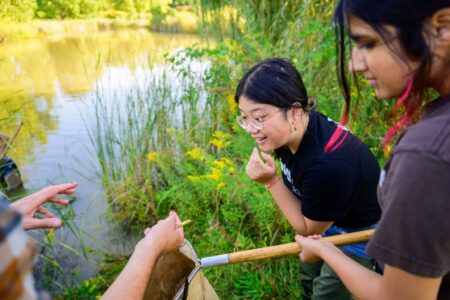
Plant biologists explore everything that involves plants, from their structure and functions to how these could be transformed into leading-edge technologies through innovation and translation into agriculture. Also known as botanists and plant scientists, they not only contribute to the well-being of these florae but also to society as they play a vital role in industries like food production, pharmaceuticals, biotechnology, and many others.
Some go on to become towering figures in science for helping the world understand how plant genes are distributed and how tumours are reversible in plant cells or for saving forests from big-business exploitation. Their contributions are far, many, and increasingly important in a world grappling with a climate crisis, mass urban migration, and more.
As the history of this field shows, a degree in plant biology can take you far – especially when it comes from the following top-ranked universities.

The department has opportunities for you to solve real-world issues through its unique research. Source: Rutgers, The State University of New Jersey
Rutgers, The State University of New Jersey
In the Department of Plant Biology at Rutgers, The State University of New Jersey, hands-on learning is front and centre. Being an undergraduate student here means working alongside expert researchers in real-world settings, building the skills and insights needed to drive change in areas as diverse as sustainable agriculture, climate resilience, and plant natural products for human health.
Indeed, opportunities are broad. Take, for example, the work of the undergraduate Weed Science team, who partnered with researchers to study the biology of Carolina redroot. Student Marian Hollenbeck’s edible garden outside the campus café provides education to students and fresh food for the guests, while student Vaidik Patel’s work investigating chilling tolerant basil is preparing him for a future in sustainable crop development. Carly Green, another student, brings the Floriculture Greenhouse to life with her project on interactive plant cataloguing.
Such ambitions are typical of inspired students with access to affiliated research farms and centres across New Jersey, which also happens to host over 400 biotechnology companies. These stations provide fertile ground for horticultural research, sustainable agriculture, networking, and of course, experiential learning.
So whether you’re interested in solving global food security challenges, pioneering plant-based biotechnologies, or even healing through plants in the only American Horticultural Therapy Association-accredited programme of its kind, this department’s vast opportunities will ensure you find your niche.
The undergraduate programme in Plant Science will walk you through each crucial stage of beginning your professional journey. It supports students in their academic and career journeys from the start, with one-on-one advising and a course dedicated to career development. You learn how to identify your interests and values, build your skills and resume, practice networking with industry leaders and more. With additional opportunities provided by the Rutgers Career Centre, these resources guarantee a seamless transition into your career.
Apply to the Department of Plant Biology today.

Enrolling at the Department of Plant Biology at the University of California, Davis will grant you access to its various facilities. Source: UC Davis College of Biological Sciences/Facebook
University of California, Davis
The Department of Plant Biology at the University of California, Davis prides itself on pioneering research on plants. Research here primarily focuses on plant developmental biology and physiology, plant-environment and inter-organismal interactions, and plant biochemistry and metabolism – all of which address or aim to advance crop improvement, natural product engineering, and other bio-based technologies.
As a student here, you’ll get early exposure to what is to come when you finally work in the industry. Your exclusive access to facilities like the Botanical Conservatory, Controlled Environment Facility, and Research and Teaching Greenhouses will only bring to life what you learn from textbooks.
Such practical experiences are highly valuable to anyone’s career. To further help you in landing your professional journey, the university provides a career centre where you can find opportunities that will land you your dream job. Visit its career fairs, events, workshops, and many more weekly activities to explore different career paths, expand your network, and prepare to enter the job market. There will also be information sessions where employer representatives and recruiters let you in on their company, their position requirements, and their interview process.

Texas A&M University Career Centre hosts more than 700 workshops, 15 career fairs, 100 employer information sessions, panel discussions, and many more. Source: Texas A&M University/Facebook
Texas A&M University
Texas A&M University‘s Department of Plant Pathology and Microbiology is the leading institution researching plant diseases and plant-microbe interactions that directly and indirectly impact the world. Here, you will learn to come up with solutions to address health, environmental, food safety, and sustainable issues through hands-on programmes.
Apart from classroom lessons and laboratory research, you are encouraged to engage with student organisations, volunteer, and undertake impactful internships – important learning experiences that will prepare you for successful careers.
Take student Merry Colclasure, for example, who is interning at Four Rivers Nuclear Partnership, a contractor for the US Department of Energy in Kevil, Kentucky. Her role within the environmental compliance department has given her early exposure to various aspects of a decommissioned power plant including the operations of water treatment facilities, steam plants, monitoring wells, outfalls and landfills.
Beyond internship, the university is just as generous in helping you with your career progression. The Career Centre connects scores of students to various job opportunities, alongside hosting more than 700 workshops, 15 career fairs, 100 employer information sessions, panel discussions, and many more online and in person.

The Department of Botany at the University of British Columbia is one of the largest and strongest in North America. Source: University of British Columbia/Facebook
University of British Columbia
The Department of Botany at the University of British Columbia is one of the largest in North America and offers a wide range of research and educational programmes. With specialisations ranging from organismal to the molecular level, the department is perfect for students who have a deep interest in learning and exploring plant, algal, fungal and protist sciences.
The department runs programmes for under- and postgraduates, both of which emphasise experiential learning. It’s exciting to study here thanks to the frequent discoveries and findings, like the discovery of the “triantha occidentalis” plant which marked the first new carnivorous plant identified in 20 years. “We’re thrilled to have identified one growing right here in our own backyard on the West Coast,” says department professor Dr. Sean Graham.
With such findings, many students stay to pursue graduate study. Those who venture into industry have the full support of the university’s Career Centre. Third dedicated team organises events and workshops where students can gain exclusive insights from alumni and employers and exoand their network. There are also workshops for you to develop your job search skills, including writing the perfect resume, negotiating offers, highlighting your strengths in interviews, and many more.
*Some of the institutions featured in this article are commercial partners of Study International










